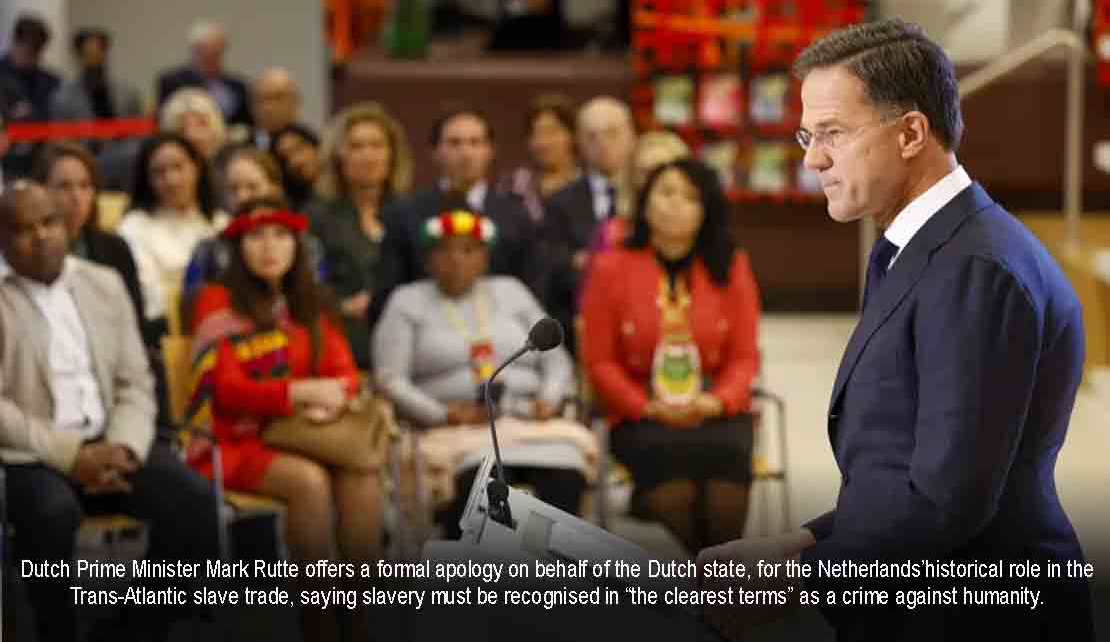Netherlands PM Mark Rutte apologises for Dutch government’s role in slavery

THE HAGUE, Netherlands, December 19, 2022 - While Britain and the United States, two of the major beneficiaries of the Trans-Atlantic slave trade remain shamelessly silent about their role in that international human atrocity, Prime Minister of the Netherlands Mark Rutte, today in a nationally televised broadcast, formally apologised on behalf of the Dutch state for its historical role in slavery, and for the arising consequences that he acknowledged continue into the present day.
In a speech at the national archives in The Hague, the Dutch prime minister acknowledged the past “cannot be erased, only faced up to”. But for centuries, he said, the Dutch state had “enabled, encouraged and profited from slavery”.
People were “commodified, exploited and traded in the name of the Dutch state”, he said, adding: “It is true nobody alive today bears any personal guilt for slavery … But the Dutch state bears responsibility for the immense suffering of those who were enslaved, and their descendants.
Today, on behalf of the Dutch government, I apologise for the past actions of the Dutch state, ”Rutte said, speaking at a nationally televised speech at the Dutch National Archives.
“For centuries, the Dutch state and its representatives have enabled and stimulated slavery and have profited from it.
“It is true that nobody alive today bears any personal guilt for slavery … [however] the Dutch state bears responsibility for the immense suffering that has been done to those that were enslaved and their descendants.”
The apology comes amid its current struggles with racism and a wider reconsideration of the country’s colonial past, including its announced efforts to return looted art.
Rutte’s historic apology, while welcomed, had been met with some resistance by a number of organizations that said such an apology should have been delivered by King Willem-Alexander in the former colony of Suriname, on July 1, 2023 – the 160th anniversary of Dutch abolition.
Slavery was formally abolished in all Dutch overseas territories on 1 July 1863, making the Netherlands one of the last countries to outlaw the practice, but it took a further decade to end in Suriname because of a mandatory 10-year transition period.
The Netherlands’ involvement in slavery began in the 17th century when the transatlantic slave trade was already being carried out by other former European colonial powers like Spain and Portugal.
Through the Dutch West India Company (WIC), the Dutch Empire began colonising large parts of land in South America and the Caribbean, and bought slaves from Africa to work on the sugar, cotton and coffee plantations of these lands.
Historians estimate that at the height of its 16th- to 17th-century empire, Dutch traders shipped up to 600,000 enslaved Africans to South American and Caribbean colonies such as Suriname and Curaçao, and as many or more to South Africa and East India, modern-day Indonesia.
![Johan Roozer of the Suriname National Commemoration of Slavery Remembrance Committee speaks to reporters in The Hague [File: Remko De Waal/EPA]](/images/johan-roozer.webp)
According to local media reports, the government also plans to announce a 200 million-euro ($212.8m) fund to promote more awareness about the Netherlands’ role in slavery and another 27 million euros ($28.7m) to open a slavery museum.
The prime minister of the Dutch Caribbean territory of Sint Maarten, Silveria Jacobs, told Dutch media at the weekend that the island would not accept any government apology “until our advisory committee has discussed it and we as a country discussed it”.
A Sint Maarten activist, Rhoda Arrindell, said: “We’ve been waiting for a few hundred years for true reparatory justice. We believe that we can wait a little further.”
Roy Kaikusi Groenberg of the Honour and Recovery Foundation, a Dutch Afro-Surinamese organisation, said there had not been enough consultation with descendants, describing the government’s handling of the issue as a “neocolonial belch.”
The Netherlands has taken time to address its colonial past, adding the history of Dutch slavery to the school curriculum only in 2006. “There is a sector in society that really clings to colonial pride,” said Karwan Fatah-Black, of the University of Leiden.
Rutte acknowledged a clumsy handling of the run-up to the announcement and said the Dutch government is sending representatives to Suriname, as well as to Caribbean islands that remain a part of the kingdom of the Netherlands with varying degrees of autonomy: Curacao, Sint Maarten, Aruba, Bonaire, Saba and Sint Eustatius.
